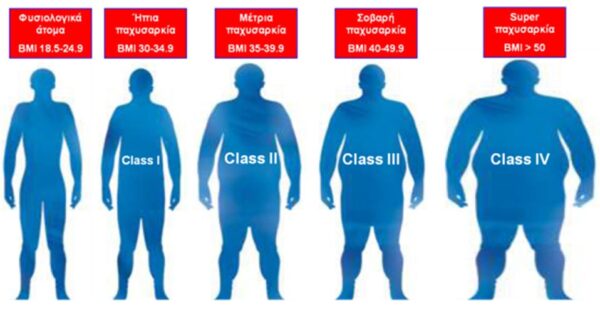 Obesity is a complex disease involving an excessive amount of body fat. Obesity is a medical problem that increases the risk of other diseases and health problems, such as heart disease, high blood pressure, diabetes, and certain cancers.
Obesity is a complex disease involving an excessive amount of body fat. Obesity is a medical problem that increases the risk of other diseases and health problems, such as heart disease, high blood pressure, diabetes, and certain cancers.
Usually, obesity results from a combination of inherited factors, combined with the environment and personal diet and exercise choices.
The good news is that even modest weight loss can improve or prevent the health problems associated with obesity. Dietary changes, increased physical activity and behavior changes can help you lose weight. Prescription medications and weight-loss procedures are additional options for treating obesity.
Symptoms
Obesity is diagnosed when body mass index (BMI) is 30 or higher. To determine the body mass index divide your weight in kilograms by your height in meters squared.
BMI Weight status
Below 18.5 Underweight
18.5-24.9 Normal
25.0-29.9 Overweight
30.0 and higher Obesity
For most people, BMI provides a reasonable estimate of body fat. However, BMI doesn’t directly measure body fat, so some people, such as muscular athletes, may have a BMI in the obesity category even though they don’t have excess body fat.
Causes
Although there are genetic, behavioral, metabolic, and hormonal influences on body weight, obesity occurs when you take in more calories than you burn through exercise and normal daily activities. Your body stores these excess calories as fat.
Social and economic issues
Social and economic factors are linked to obesity.
Age
Obesity can occur at any age, even in young children. But as you age, hormonal changes and a less active lifestyle increase the risk of obesity. In addition, the amount of muscle in the body tends to decrease with age. Generally, lower muscle mass leads to a decrease in metabolism.
Other factors
- Stress
- Microbiome. Your gut bacteria are affected by what you eat and may contribute to weight gain or difficulty losing weight.
- Lack of sleep.
- Quitting smoking.
- Previous attempts to lose weight. Previous attempts at weight loss followed by rapid weight regain may contribute to further weight gain. This phenomenon, sometimes called yo-yo dieting, can slow your metabolism.
- Pregnancy. Weight gain is common during pregnancy. This weight gain may contribute to the development of obesity in women.
Even if you have one or more of these risk factors, it doesn’t mean that you’re destined to develop obesity. You can counteract most risk factors through diet, physical activity and exercise, and behavior changes.
Obesity – Complications
People with obesity are more likely to develop several potentially serious health problems, including:
- Heart disease and strokes.
- Type 2 diabetes.
- Digestive problems.
- Gynecological and sexual problems
- Osteoarthritis
- Certain cancers. Obesity may increase the risk of cancer of the uterus, cervix, endometrium, ovary, breast, colon, rectum, esophagus, liver, gallbladder, pancreas, kidney, and prostate
- Severe COVID-19 symptoms. People who have severe cases of COVID-19 may require treatment in intensive care units or even mechanical assistance to breathe.
Quality of life
Obesity can diminish the overall quality of life.
Other weight-related issues that may affect the quality of life include:
- Depression
- Disability
- Sexual problems
- Lower work achievement
- Social isolation
Prevention
Exercise regularly.
Follow a healthy-eating plan
Know and avoid the food traps that cause you to eat.
Monitor your weight regularly
Obesity – Treatment
The goal of obesity treatment is to reach and stay at a healthy weight. This improves your overall health and lowers your risk of developing complications related to obesity.
Dietary changes
Reducing calories and practicing healthier eating habits are vital to overcoming obesity. Although you may lose weight quickly at first, steady weight loss over the long term is considered the safest way to lose weight and the best way to keep it off permanently.
Avoid drastic and unrealistic diet changes, such as crash diets, because they’re unlikely to help you keep excess weight off for the long term.
Exercise and activity
Increased physical activity or exercise is an essential part of obesity treatment. Most people who can maintain their weight loss for more than a year get regular exercise, even simply walking.
Behavior changes
A behavior modification program can help you make lifestyle changes and lose weight and keep it off.
Weight-loss surgery
In some people, weight-loss surgery, ( bariatric surgery), is an option. Weight-loss surgery limits the amount of food you’re able to comfortably eat or decreases the absorption of food and calories, or it does both.
Weight-loss surgery for obesity may be considered if you have tried other methods to lose weight that haven’t worked and:
The National Institute of Health consensus has suggested the following guidelines for weight loss surgery in obese patients:
- Patients with a BMI of greater than 40 (morbid obesity)
- Patients with a BMI of greater than 35 who have serious medical problems such as sleep apnea that would improve with weight loss
A study done in Sweden compared the rates of diabetes and hypertension in two groups of obese patients: those who underwent surgery and those who didn’t. Each group had a similar body weight at baseline (the start of the study). At two years, diabetes and high blood pressure were lower in the patients treated with surgery.
Common weight-loss surgeries include:
- Gastric bypass surgery.
- Adjustable gastric banding.
- Biliopancreatic diversion with duodenal switch.
- Gastric sleeve.





